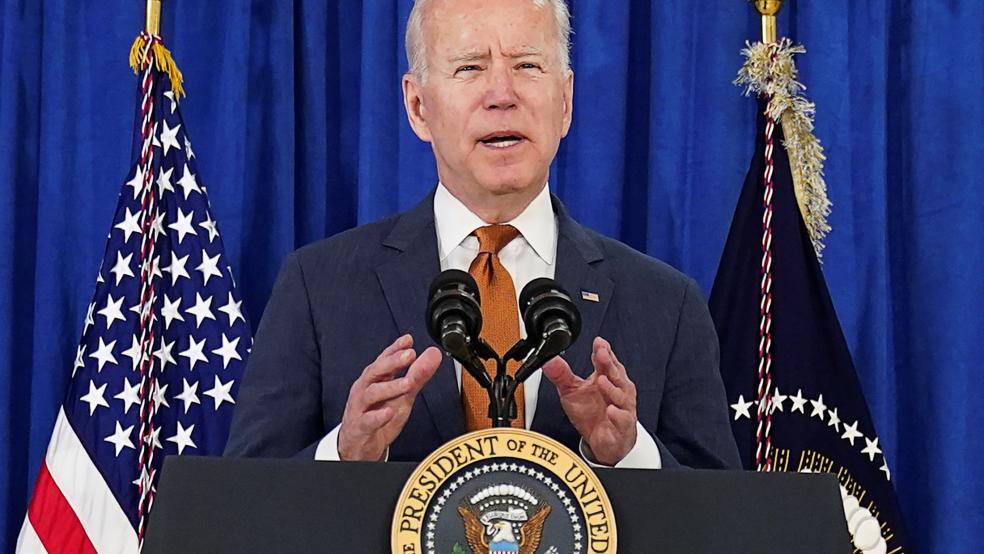Republicans led by Sen. Shelley Moore Capito (R-WV) on Friday upped their infrastructure offer by about $50 billion, but President Biden said it’s still not enough, according to the White House. The two sides agreed to speak again on Monday.
“Senator Capito conveyed to the president a new offer from her group which consisted of an about $50 billion increase in spending across a number of infrastructure programs,” White House Press Secretary Jen Psaki said in a statement. “The president expressed his gratitude for her effort and goodwill, but also indicated that the current offer did not meet his objectives to grow the economy, tackle the climate crisis, and create new jobs. He indicated to Senator Capito that he would continue to engage a number of senators in both parties in the hopes of achieving a more substantial package.”
Republicans had previously presented a $928 billion infrastructure package that included $257 billion in new spending. Biden, who initially proposed a wide-ranging $2.25 billion plan, had scaled back his offer to $1.7 trillion and, in a meeting with Capito earlier this week, reportedly insisted on $1 trillion in new spending. If the latest GOP offer increased the new spending by the roughly $50 billion cited by the White House, it would still leave the two sides nearly $700 billion apart.
Manchin not ready for Democrats to go it alone: Biden is continuing the talks in the face of increasing pressure from some Democratic lawmakers and progressive activists to move ahead without GOP support. Some analysts have suggested that the ongoing negotiations are, at least to some degree, a prolonged act of political theater aimed at eventually securing the backing of Sen. Joe Manchin (D-WV) for a Democratic infrastructure package. Manchin, a key vote in the evenly divided Senate, has been outspoken about his desire for bipartisanship — and he said again Thursday that he doesn’t believe Democrats should try to pass legislation on their own.
In interviews with CNN and NBC News, Manchin said he wants bipartisan talks to continue and believes they can yield results. "We need to do something in a bipartisan way,” Manchin told CNN. “These [talks] take time. I know everyone is in a hurry right now. If anyone understands the process it’s President Joe Biden. … I hope his staff understands it also. ... We've got to work together, and that takes a lot of time and energy and patience.”
Any effort to pass an infrastructure package using the special process called budget reconciliation would require unity among all 50 Senate Democrats, meaning that Manchin’s objection could threaten the prospects for passage.
Manchin said his push for bipartisanship also applied to voting rights legislation being considered. He added that he would not bend to pressure from fellow Democrats who want to move ahead on infrastructure without Republicans and have pressed to change the Senate’s filibuster rules, which now require 60 votes to advance most legislation.
The pressure to strike a bipartisan deal may also have been ratcheted up by a ruling from the Senate parliamentarian last week that effectively means that Democrats will only be able to use the reconciliation process one more time this year. “Aides say there’s now more pressure on Biden to cut a deal with Senate Republicans on a scaled-down infrastructure package because that would allow for more spending in a reconciliation package with priorities that are unlikely to get GOP support,” The Hill’s Alexander Bolton reports.
Progressives ramp up the pressure: Still, some other Democratic lawmakers are increasingly urging Biden to cut off talks with Capito or warning that the president may give up too much in trying to win over Republicans — and could lose needed Democratic votes in the process.
“If what we’ve read is true, I would have a very difficult time voting yes on this bill—$2 trillion was already the compromise,” Rep. Jamaal Bowman (D- NY) said Thursday, according to The Wall Street Journal. “President Biden can’t expect us to vote for an infrastructure deal dictated by the Republican Party.”
And Sen. Sheldon Whitehouse (D-RI) tweeted earlier this week: "Best case: shrunk infrastructure bill w no serious climate stuff; Rs get bipartisan cred. Worst case: delay for nothing. Either way: climate to the curb."
What’s next: Psaki told reporters that the White House is keeping a "range of pathways" open on the infrastructure package and pointed to the transportation bill moving through the House Committee on Transportation and Infrastructure. Biden also spoke with Rep. Peter DeFazio (D-OR), the Transportation and Infrastructure Committee chairman, on Friday afternoon. DeFazio on Friday introduced a five-year, $547 billion surface transportation reauthorization bill called the INVEST in America Act that includes $343 billion for roads, bridges and safety improvements, $109 billion for transit and $95 billion for passenger and freight rail projects.
The package, which will be debated by DeFazio’s panel next Wednesday, comes after the Senate Environment and Public Works Committee unanimously advanced a $304 billion reauthorization bill that lawmakers have suggested could form the basis for an infrastructure deal.





